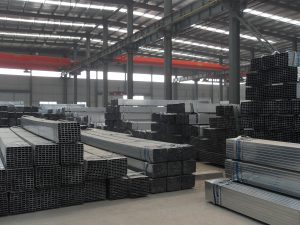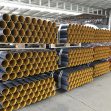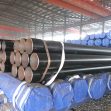Companies challenges in cleaner technologies
Cost: While sustainable technologies can save money in the long run by reducing energy costs and avoiding environmental penalties, the upfront costs can be significant. For example, installing renewable energy sources like wind turbines or solar panels may require significant capital investment. In addition, many sustainable technologies are still in the early stages of development, which can make them more expensive to implement.

Scale: Steel production of square steel tube for sale is a large-scale industrial process, and implementing sustainable technologies at this scale can be a challenge. For example, carbon capture and storage (CCS) requires significant infrastructure and can be difficult to retrofit into existing steel production processes. This means that developing sustainable technologies that can be integrated into existing processes at scale is crucial.
Technical complexity: Sustainable technologies are often more complex than traditional technologies, and require specialized knowledge and expertise to implement and operate. For example, implementing CCS requires expertise in chemical engineering, and developing new, more sustainable steel products like structural steel pipe requires expertise in materials science. This can be a challenge for steel companies that may not have the necessary skills or experience in-house.
Regulatory uncertainty: The regulatory landscape for sustainable technologies is constantly evolving, and companies may face uncertainty around future regulations, incentives, and penalties. This can make it difficult for companies to plan and invest in sustainable technologies with confidence. Governments can help address this challenge by providing clear and consistent regulatory frameworks that support the adoption of sustainable technologies.
Supply chain challenges: The steel industry relies on a complex global supply chain that can be challenging to navigate when implementing sustainable technologies. For example, sourcing sustainable raw materials like black iron steel pipe or sustainably harvested timber can be difficult, and companies may need to work with suppliers to ensure that their products meet sustainability standards.
Public perception: Finally, public perception can be a challenge for steel companies that are trying to adopt sustainable technologies. The steel industry has traditionally been associated with high levels of pollution and environmental impact, and it can be challenging to change public perceptions of the industry. However, by adopting sustainable technologies and communicating these efforts to the public, steel companies can help change the narrative around the industry and demonstrate their commitment to sustainability.
In conclusion, while the adoption of sustainable technologies in the steel industry for Gi square steel pipe is a critical step towards a more sustainable future, there are many challenges that companies face in this area. These include cost, scale, technical complexity, regulatory uncertainty, supply chain challenges, and public perception. Addressing these challenges will require collaboration between industry stakeholders, governments, and research institutions, as well as continued investment in research and development.
Tel: +86 18202256900 Email: steel@fwssteel.com
Previous: Comply with regulatory standards










